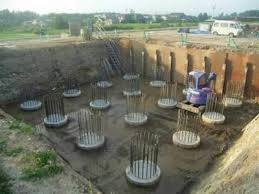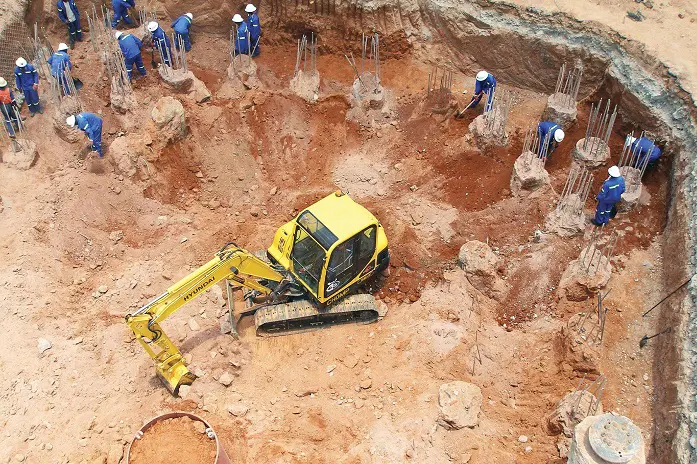Recognizing the Basics: About Geotechnical Engineering in Modern Construction
Recognizing the Basics: About Geotechnical Engineering in Modern Construction
Blog Article
The Significance of Geotechnical Engineering in Dealing With Environmental Challenges and Enhancing Construction Safety
Geotechnical design offers as a cornerstone in the crossway of ecological stewardship and building security, giving essential understandings right into the habits of soil and rock under numerous conditions. By carrying out strategic website examinations and customized mitigation actions, geotechnical engineers play a crucial role in protecting both human lives and eco-friendly stability.

Duty of Geotechnical Design
Geotechnical engineering plays a crucial role in the layout and building and construction of framework by attending to the behavior of soil and rock products under numerous conditions. This field of design is crucial for understanding the interaction in between frameworks and the ground, that includes determining the load-bearing capacity of dirt, analyzing security, and anticipating potential negotiation or failing.
Geotechnical designers are liable for carrying out site investigations, which entail sampling and screening dirt and rock to gather data on their physical and chemical residential or commercial properties. This details is crucial for developing structures, maintaining walls, and other earth-retaining frameworks that ensure safety and security and durability. Geotechnical engineering educates the selection of proper building and construction methods and products, therefore lessening dangers associated with soil habits.
Furthermore, the assimilation of geotechnical engineering principles right into city planning and ecological monitoring is important for resolving challenges such as ground contamination and groundwater administration. By comprehending geotechnical variables, engineers can establish lasting remedies that enhance the durability of framework against natural threats, while additionally promoting environmental stewardship. Eventually, the role of geotechnical engineering is crucial for achieving safe, resilient, and ecologically aware building and construction practices.
Soil Erosion Reduction
Dirt disintegration presents a significant danger to both environmental stability and facilities integrity, influencing roughly 24 billion bunches of fertile soil shed annually worldwide. This sensation is exacerbated by elements such as deforestation, urbanization, and poor agricultural practices. Geotechnical engineering plays a crucial role in creating effective soil disintegration reduction approaches that safeguard both the environment and building and construction projects.
One approach entails the implementation of erosion control approaches such as plant life growing, which supports soil through origin systems. In addition, the building of maintaining balconies and wall surfaces can efficiently decrease surface drainage and secure prone areas from erosion. Proper drain style is also essential; it minimizes water buildup and guides excess runoff far from essential frameworks.
Furthermore, geotechnical designers utilize soil stablizing techniques, such as the application of geotextiles and eco-friendly floor coverings, to enhance dirt cohesion and protect against deterioration - geotechnical engineer description. Routine monitoring and analysis of erosion-prone sites make it possible for timely treatments, guaranteeing lasting sustainability. By integrating these techniques, geotechnical design not only minimizes the impacts of dirt disintegration but additionally adds to the durability of infrastructure against ecological obstacles, eventually cultivating a safer and extra sustainable developed setting
Groundwater Defense Strategies
Groundwater serves as an essential resource for drinking water, farming, and commercial processes, making its security essential for environmental sustainability and public wellness. Reliable groundwater protection methods are essential in reducing contamination threats and ensuring the longevity of this resource.

Normal tracking of groundwater quality is additionally vital, enabling very early detection of contamination resources and helping with prompt remediation initiatives. Employing innovative innovations, such as geophysical studies and remote sensing, help in identifying potential hazards to groundwater reserves.
Furthermore, public education and learning and stakeholder involvement are vital, cultivating area support for groundwater defense campaigns. geotechnical companies in south africa. By incorporating regulatory steps, technical innovations, and neighborhood participation, we can create an extensive structure that safeguards groundwater sources while promoting sustainable advancement and construction practices
Landslide Danger Monitoring
Landslides pose significant dangers to both human safety and security and framework, making effective danger administration approaches important. Geotechnical engineering plays a critical duty in identifying, evaluating, and mitigating landslide dangers. A thorough understanding of incline security, dirt technicians, and hydrology is vital for developing effective danger administration plans.
The very first step in landslide danger administration includes comprehensive site investigations, which include geological mapping and soil testing. These investigations aid designers evaluate the potential for landslides by identifying critical elements such as incline angles, dirt structure, and water material. Making use of innovative modern technologies such as remote picking up and geophysical studies can improve the precision of these analyses.
When risks are identified, appropriate reduction procedures can be carried out. These may include design options such as maintaining their explanation walls, drainage systems, and incline stablizing techniques. Checking systems need to be established to detect indicators of ground movement and adjustments in water levels, permitting for proactive treatments.

Enhancing Building Security
Building and construction websites often provide a myriad of dangers that can endanger employee security and job stability. Geotechnical engineering plays a vital function in improving building safety by providing essential understandings into subsurface conditions. Through thorough dirt and rock evaluation, geotechnical engineers can identify possible dangers, such as soil instability, groundwater issues, and seismic susceptabilities, which may compromise the safety of building and construction activities.
Implementing geotechnical options, such as correct structure style and the usage of keeping structures, minimizes these threats considerably. These remedies not just make sure the security of the structures being developed yet additionally create a much safer working setting for construction workers.
Moreover, promoting a culture of safety through training and adherence to developed safety procedures better improves construction site safety and security. By integrating geotechnical knowledge into the preparation and implementation stages, construction jobs can attain greater safety criteria, ultimately shielding employees and making sure successful job completion.
Final Thought
To conclude, geotechnical engineering functions as a vital technique in tackling ecological obstacles and advertising construction safety. Via effective soil erosion reduction, groundwater protection methods, and landslide threat administration, geotechnical engineers add to the growth of durable infrastructure. The assimilation of these methods fosters a more secure building and construction atmosphere and enhances the sustainability of civil design jobs. Ultimately, the expertise of geotechnical designers is important in safeguarding both natural deposits and human lives against prospective hazards.
Geotechnical engineering offers as a cornerstone in the crossway of ecological stewardship and construction security, giving crucial understandings right into the behavior of soil and rock under numerous conditions. Geotechnical engineering notifies the option of appropriate building techniques and products, thereby reducing dangers linked with soil behavior.
Geotechnical engineering plays an essential duty in creating effective soil erosion reduction approaches that safeguard both the environment and building jobs.
Additionally, geotechnical designers use dirt stabilization techniques, such as the application of geotextiles and biodegradable mats, to improve soil cohesion and avoid destruction. Via thorough dirt and rock evaluation, geotechnical designers can recognize possible threats, such as dirt instability, groundwater concerns, and seismic susceptabilities, which might endanger the safety and security of building and construction my site tasks.
Report this page